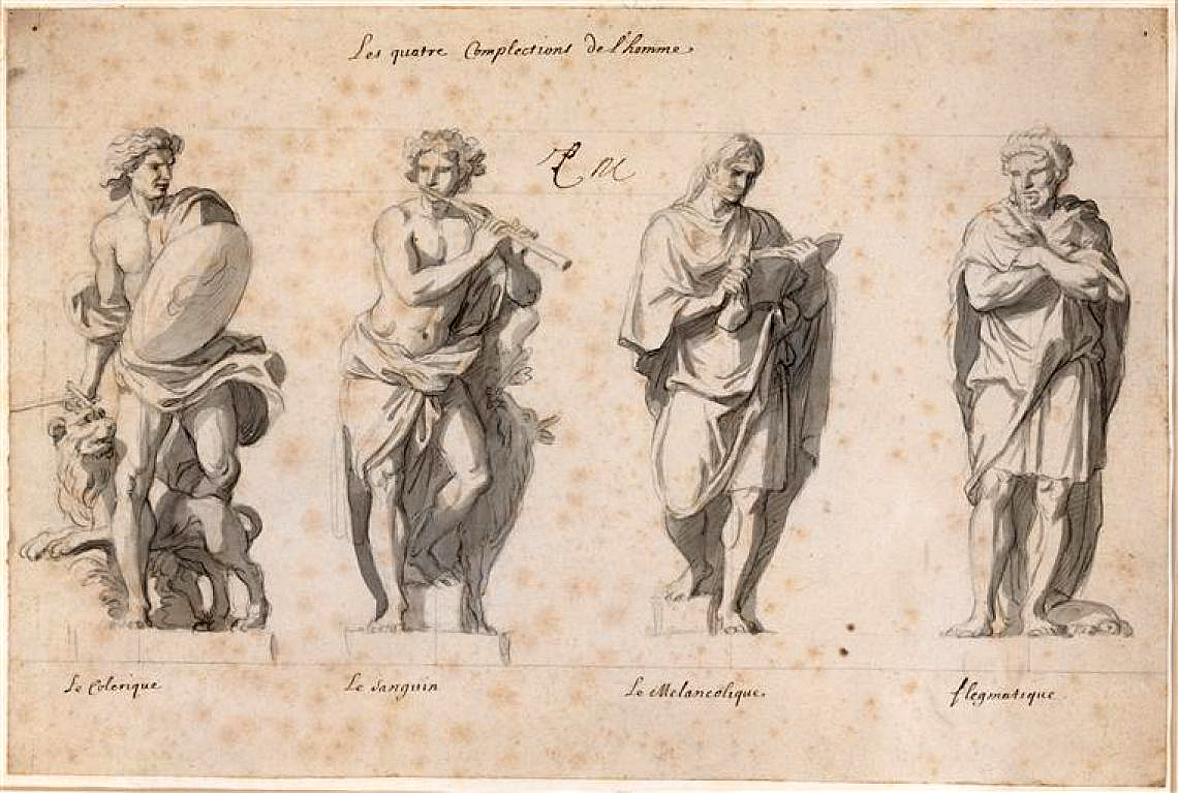If you have not heard about the four famous temperaments, now it is a good time to become familiar with them. The four famous temperaments are sanguine, melancholic, choleric and phlegmatic. Most people find themselves falling under at least one of these temperaments. An interesting fact about these four temperaments is that they originated by four bodily fluids describing the personality of a person.
 As someone with a sanguine-choleric personality, I am considered to be someone with red blood and yellow bile. For the sanguine, red blood meant that you are “hot,” symbolizing energy. The yellow bile of the choleric is moist, symbolizing punctuality in your actions. Lacking in the other temperaments, I seem to attract phlegmatic-temperament people the most, who are more calm and relaxed. In this way, I am pulled into the direction of their temperaments and find myself being more balanced. All temperaments are characteristic of who we are as a person. They are ‘naturally’ part of us and are a part of our perceptions and decisions.
As someone with a sanguine-choleric personality, I am considered to be someone with red blood and yellow bile. For the sanguine, red blood meant that you are “hot,” symbolizing energy. The yellow bile of the choleric is moist, symbolizing punctuality in your actions. Lacking in the other temperaments, I seem to attract phlegmatic-temperament people the most, who are more calm and relaxed. In this way, I am pulled into the direction of their temperaments and find myself being more balanced. All temperaments are characteristic of who we are as a person. They are ‘naturally’ part of us and are a part of our perceptions and decisions.
Purity is commonly mistaken for a temperament. This is because there are temperaments that are easily equated to purity, such as sensibility and insensibility. Sensibility and insensibility are temperaments because we can naturally be more “sensitive” or “insensitive” in our actions. In the case of sex, the sensible person is open to responding to the value of sex, whereas the insensitive person closes themselves off to its value. As we can see, purity can also be perceived as “closing” oneself off to the value of sex. But when we make the distinction between purity as a virtue and insensibility as a temperament, we realize this is not true. The genuinely pure person is by no means closing themselves off to the value that is good, but rather has a “genuine transcendence of matter.” [1] He conquers the temptations of the flesh.
In regard to virtues, Hildebrand says that there has to be a “distinctive apprehension of values and a surrender to them.” [2] We are morally inclined to become virtuous, but sometimes fall short into vice. Purity is a virtue because virtue is not a characteristic of ourselves “simply given” like temperaments. [3] Hildebrand states that our temperaments can influence our ability to be virtuous: “No doubt there are temperaments which favour the development of particular virtues.” [4] This can be seen in the example that I provided previously. As a sanguine because I have more energy, I am more likely to engage with other people in which I am given a greater opportunity to show love. Also, as a choleric, I am more likely to practice obedience because being prompt and efficient is already part of me. As you see, my temperaments influence the virtues of love and obedience, but are not actually them. The only way for my temperaments to influence the virtues of love and obedience is if I choose to respond to the demands of the value. The value calls me to a greater depth of making these virtues known, such as not hating the others I am engaged with, but rather loving them. This means we have to practice virtue and value response. This takes time and consistency.
As we continue to look at purity, we should not reduce this virtue to a temperament, just as a temperament will never be a virtue. It can only aid in the process of acquiring proper virtue. Again, the virtue of purity is not naturally given to us. Like all other virtues, coming to a full sense of purity takes time. It requires patience and understanding, and one must allow virtue to grow with the help of the temperaments.
Image 1: Charles Le Brun, The Four Temperaments. http://upload.wikimedia.org/wikipedia/commons/6/6e/Charles_Le_Brun-Grande_Commande-Les_Quatre_temperaments.jpg 17th Century, 1674 Commissioned by Louis XIV of France
[1] Dietrich von Hildebrand, In the Defense of Purity. 31
[2] Ibid., 33
[3] Ibid., 33
[4] Ibid., 34
0 comments
Note: Only a member of this blog may post a comment.